STATEHOUSE REPORT | ISSUE 21.50 | DEC. 16, 2022
BIG STORY: CofC to unveil McConnell portrait on anniversary of secession
NEWS BRIEFS: Most state parks to offer free electric vehicle charging stations soon
LOWCOUNTRY, Ariail: Going, going, gone
COMMENTARY, Brack: Some have been naughty, others nice in 2022
SPOTLIGHT: Charleston Animal Society
ANOTHER VIEW: Act 388’s impact on school taxes largely unknown today, study shows
FEEDBACK: Send us your thoughts
MYSTERY PHOTO: Brick building with green door
CofC to unveil McConnell portrait on anniversary of secession
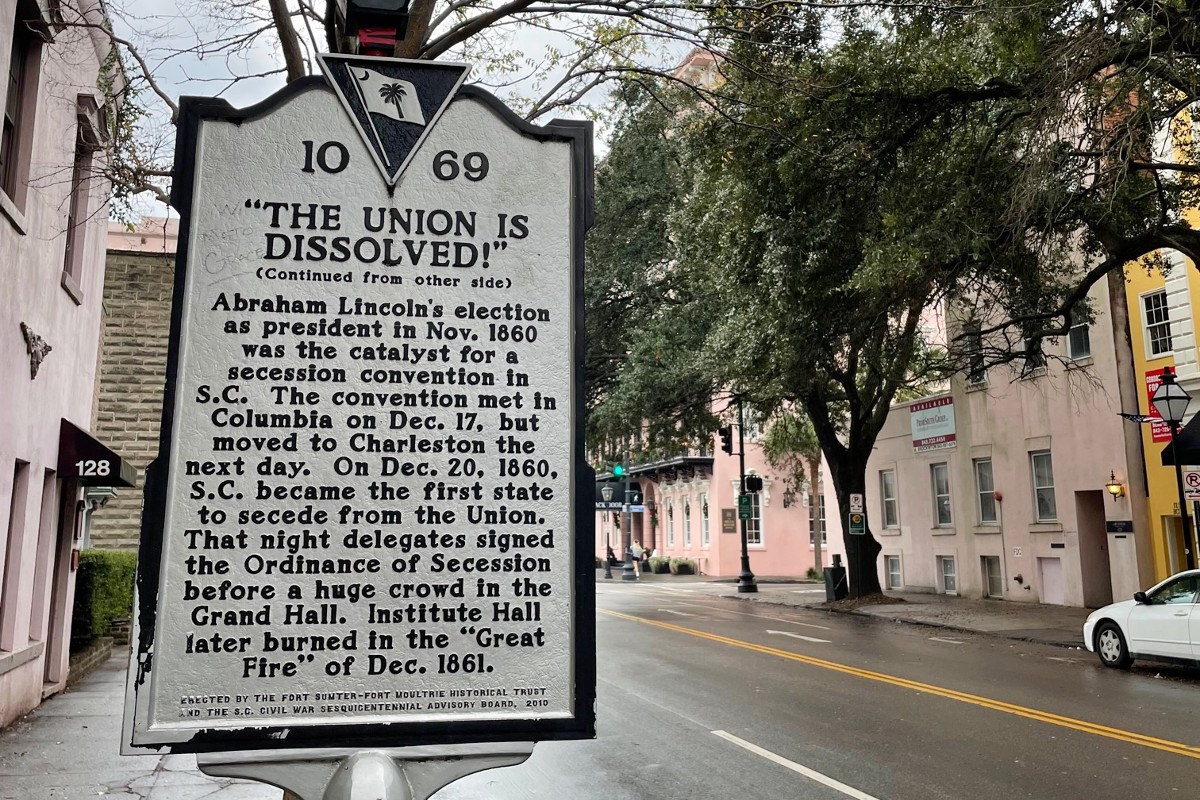
By Andy Brack | first published in the Charleston City Paper | The College of Charleston (CofC) will unveil a portrait of former President Glenn McConnell, a past lieutenant governor with a passion for the Lost Cause of the Confederacy, in a ceremony to be held on the 162nd anniversary of South Carolina’s secession from the union.
Another observed most people probably didn’t realize the unveiling was scheduled on a date tied to the Confederacy.
“Half of our students are from out of state. I don’t think they would recognize it unless it were pointed out to them.”
The portrait of McConnell, who served as the college’s president from 2014 to 2018, will be unveiled in a private ceremony at 4 p.m. Dec. 20 at the Sottile Theatre, the university confirmed. McConnell, who was one of the state’s most powerful senators before becoming lieutenant governor, is expected to attend.
“It is not a public event,” CofC spokesman Mike Robertson said. “Invitees include college officials, the Lowcountry legislative delegation and individuals who contributed private funds to pay for the portrait.”
As of Thursdday morning, there are no plans to change the time of the ceremony, Robertson said.
“This date was selected based on the availability of invitees and the academic calendar.”
Tone deaf or Yankees in charge?
McConnell, a West Ashley resident, is an attorney who once owned a Confederate memorabilia store during more than three decades in the state Senate.
Robertson had no comment when asked twice about whether the college was being “tone deaf” for holding the ceremony for McConnell on the Dec. 20 secession anniversary.
But one downtown business woman reacted, “Maybe the explanation is Yankees are in charge because, of course, they wouldn’t do this if they really understood.”
In 2010, McConnell, then a state senator, was broadly criticized for wearing the uniform of a Confederate general to a Republican event in Charleston. A widely-circulated photo showed him with two Black cultural reenactors. At the time, some criticized McConnell for being racially insensitive, but McConnell said the photo illustrated how far the state had come.
Chris Lamb, a former CofC journalism professor who now chairs the journalism and public relations department at Indiana University Indianapolis, was flabbergasted when told about the Dec. 20 ceremony.
“Oh, my gosh. That’s nuts,” he immediately reacted. Later he added, “President [Andrew] Hsu and the university have done an admirable job of addressing and atoning for the college’s racist history. But this is nuts.”
McConnell’s career of political leadership
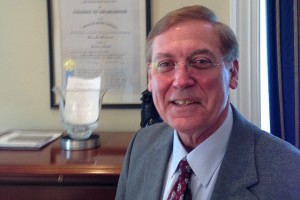
McConnell was elected as a Republican to the state Senate in 1980 to represent a district that generally centered on West Ashley and North Charleston. Through the years while in the minority, he became a master at the Senate rules to move or thwart legislation. Through the seniority system, he became chair of the powerful Senate Judiciary Committee and had a hand in many of the key issues impacting the state for two decades.
A longtime proponent of the honor of Southerners who fought in the Confederacy, McConnell was key in the state’s effort to help to raise the H.L. Hunley, the Confederate submarine that was the first to sink a ship in battle. The Hunley, which sank in South Carolina waters during the war, was located in 1995 and raised from the sea floor in 2000. Today, it’s conserved in the old Navy Yard in North Charleston, where you can visit on weekends or daily as part of a group..
McConnell also was a key player in removing the Confederate flag off of the Statehouse dome in 2000 and putting it where some said was a more prominent place — on the Statehouse grounds. He later supported removal of the flag from the grounds following the murder of Sen. Clementa Pinckney at the Emanuel AME Church shooting in 2015.
McConnell served as Senate president pro tempore from 2001, when Republicans took over Senate control, until 2012. At that time, he became lieutenant governor, ascending according to constitutional rules after the resignation of Ken Ard from the state’s number-two executive branch job.
McConnell heads to College of Charleston
In 2014, McConnell became president of the College of Charleston. He was the first College of Charleston graduate to become its president. At the time, the City Paper reported:
“That decision has sparked protests, sit-ins, and petitions from students and faculty, who decry McConnell’s lack of academic experience and his history of defending the Confederate flag’s presence on Statehouse grounds. The student Senate passed a vote of no confidence in the Board of Trustees this week because of the Board’s decision to pick McConnell over two experienced academic administrators.”
Soon after taking over at the college, McConnell said in an interview that his critics didn’t really know him. Reflecting on the 2000 controversy around the Confederate flag, he told the City Paper:
“That was a very acrimonious time. The mainstream on both sides wanted to settle it. We took four flags down: the one on the dome, the one over each podium, the one in the hall, and then we put a soldier’s flag and a soldier’s monument. Those of us on both sides of that question, we got harshly criticized for that compromise, but the mainstream of South Carolina was happy with it. And I’m not going to go back and open old wounds and animosities over this. We settled it, we moved forward, and we thought we did so in a great thing.”
After a year at the college’s helm, now-sister publication Statehouse Report published a column in which McConnell said he was starting to enjoy being CofC president – and particularly working to make the campus more diverse:
“McConnell envisioned a future campus that looked more like the state of South Carolina, a third of which is comprised of non-white minorities,” the column said. “The college today [2015] has a 15%minority population, but only about 6%of the student body is African American. Applications from Black students are up about 15% this year, a trend McConnell said he wanted to see continue. In fact, he said the college is planning to launch a pilot program in seven area counties to automatically admit anyone who graduates in the top 10% of his or her high school class.”
- Have a comment? Send to: feedback@statehousereport.com.
Most state parks to offer free electric vehicle charging
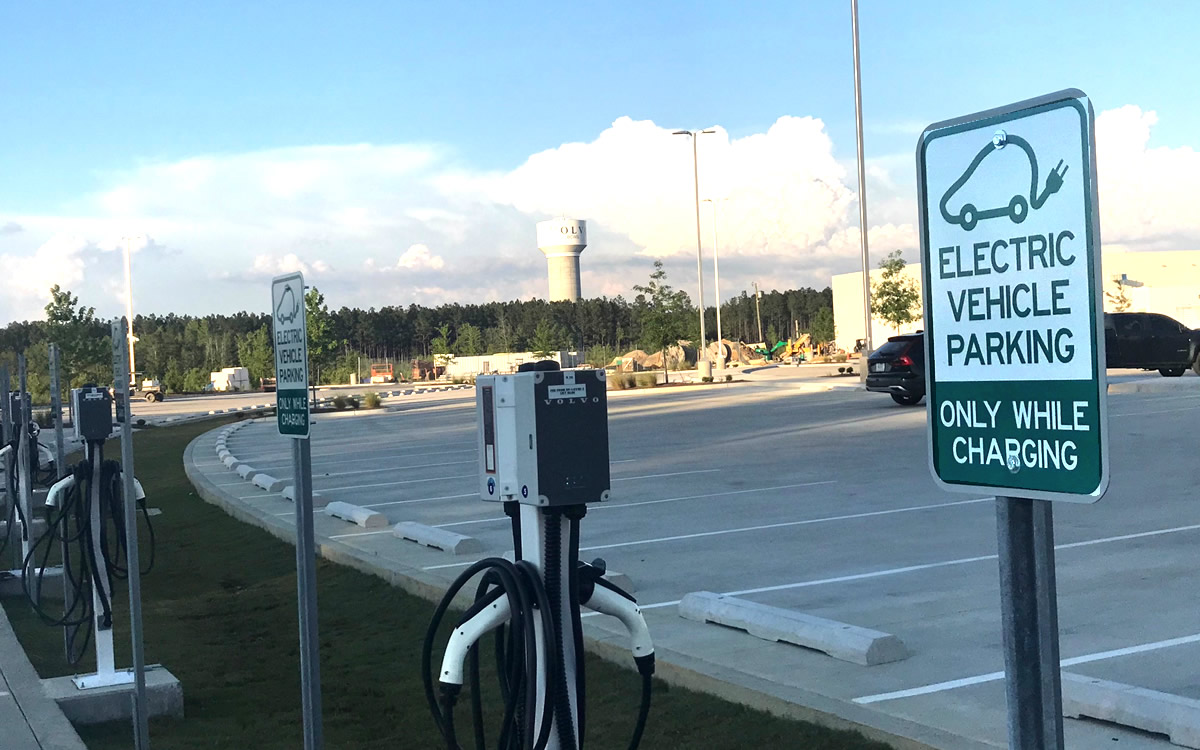
Staff reports | By the end of 2023, two-thirds of state parks will offer free electric vehicle charging stations, state officials announced Tuesday.
“EV is something that is just becoming widely popular across the country, so we’re harnessing that here,” Lt. Gov. Pamela Evette said Tuesday. “I think that is something that if you feel passionate about, then we want to make sure that technology and the growth of that industry happen right here in our state.”
In other news this week:
![]() Leaked text shows Norman called for martial law in 2021 U.S. Rep. Ralph Norman, R-S.C., is facing calls to resign following release of text messages calling for martial law after the Jan. 6 insurrection. The texts were to former White House Chief of Staff Mark Meadows. Norman later blamed frustration for the text.
Leaked text shows Norman called for martial law in 2021 U.S. Rep. Ralph Norman, R-S.C., is facing calls to resign following release of text messages calling for martial law after the Jan. 6 insurrection. The texts were to former White House Chief of Staff Mark Meadows. Norman later blamed frustration for the text.
More money should be in your pocket next year. The state’s top income tax rate was reduced from 7% to 6.5% by legislators in 2022, according to the South Carolina Department of Revenue. The amount of change will depend on a number of factors for each individual, but many state workers should expect to see taxes go down.
DSS wants to rebuild nutrition program. The Department of Social Services wants to completely rebuild the federal Supplemental Nutrition Assistance Program (SNAP). The department said the system is completely outdated and is asking lawmakers for $8.7 million in the next state budget to start rebuilding it.
Proposed bill could make S.C. residents pay $250 for drivers’ licenses. The proposed bill will allow counties to raise drivers’ license fees from $25 up to $250 for first-time applicants moving to the state.
S.C. closes out record year in economic development deals. South Carolina will close out the year with a total of $10.1 billion in capital investments. The combined projects would make a total of 13,000 new jobs in the state.
United to buy 100 Boeing 787 Dreamliners in deal worth billions. United Airlines this morning announced it would buy 100 Boeing 787 Dreamliners — all of which are built in North Charleston — in a fleet modernization deal that will stretch to 2032. And to make the news even sweeter for thousands of local workers, United says it has options to buy 100 more of the jets. Here’s the magnitude of the transaction: The company will spend at least $20 billion over the next two years on part of the order for jets made locally.
Going, going, gone
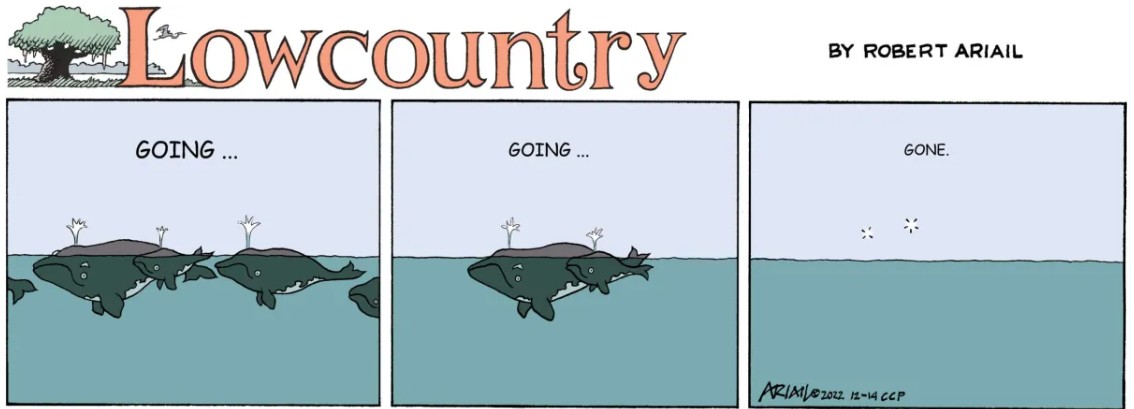
Cartoonist Robert Ariail often interprets things a little differently, but always has an interesting take on what’s going on in South Carolina. Love the cartoon? Hate it? What do you think: feedback@statehousereport.com.
Some have been naughty, others nice in 2022

By Andy Brack, editor and publisher | With Christmas around the corner, let’s look at who’s getting lumps of coal and who’s going to get some good presents.

![]() NICE: Hats off to Gov. Henry McMaster for winning reelection and for being in line to be the longest-serving governor in the state’s history when the coming term ends. Inauguration is Jan. 11.
NICE: Hats off to Gov. Henry McMaster for winning reelection and for being in line to be the longest-serving governor in the state’s history when the coming term ends. Inauguration is Jan. 11.
![]() NAUGHTY: South Carolina’s seemingly hapless Democratic Party doesn’t have lots to celebrate this year, winning no statewide seats and losing seven more seats in the S.C. House. It needs to get its act together in more ways than one.
NAUGHTY: South Carolina’s seemingly hapless Democratic Party doesn’t have lots to celebrate this year, winning no statewide seats and losing seven more seats in the S.C. House. It needs to get its act together in more ways than one.
![]() NICE: And that chance may come thanks to U.S. Rep. Jim Clyburn, South Carolina political kingmaker whose 2000 endorsement of Joe Biden breathed life into his presidential campaign. Now Biden wants South Carolina to hold the party’s first presidential primary in 2024, which should send floods of party operatives into the state – and maybe some of them will stick around to help rebuild the party.
NICE: And that chance may come thanks to U.S. Rep. Jim Clyburn, South Carolina political kingmaker whose 2000 endorsement of Joe Biden breathed life into his presidential campaign. Now Biden wants South Carolina to hold the party’s first presidential primary in 2024, which should send floods of party operatives into the state – and maybe some of them will stick around to help rebuild the party.
![]() NAUGHTY: One GOP congressman, Ralph Norman of Rock Hill, needs to go after egging on former White House Chief of Staff Mark Meadows to send in the Army to thwart the 2021 inauguration of Joe Biden. All the while, Norman publicly mewed that he wasn’t for fomenting insurrection. Give us all a Christmas gift and resign, Congressman.
NAUGHTY: One GOP congressman, Ralph Norman of Rock Hill, needs to go after egging on former White House Chief of Staff Mark Meadows to send in the Army to thwart the 2021 inauguration of Joe Biden. All the while, Norman publicly mewed that he wasn’t for fomenting insurrection. Give us all a Christmas gift and resign, Congressman.
![]() NICE: Federal Judge Michelle Childs, mentioned this year as a possibility for the U.S. Supreme Court, got a highly-esteemed appointment to the U.S. Court of Appeals for the D.C. Circuit, perhaps the nation’s second-most prestigious court. And S.C. Circuit Judge DeAndrea Benjamin, wife of former Columbia Mayor Steve Benjamin, is expected to be voted on soon for an federal appellate seat for the 4th Circuit.
NICE: Federal Judge Michelle Childs, mentioned this year as a possibility for the U.S. Supreme Court, got a highly-esteemed appointment to the U.S. Court of Appeals for the D.C. Circuit, perhaps the nation’s second-most prestigious court. And S.C. Circuit Judge DeAndrea Benjamin, wife of former Columbia Mayor Steve Benjamin, is expected to be voted on soon for an federal appellate seat for the 4th Circuit.
![]() NAUGHTY: The state Republican Party, while a powerhouse no one dreamed of 30 years ago, continues to attract far-right candidates and kowtow to division, fear and governmental grumpiness. Earth to white male Republicans: Stop telling women what they can do with their bodies and focus more on solutions for everyone in South Carolina.
NAUGHTY: The state Republican Party, while a powerhouse no one dreamed of 30 years ago, continues to attract far-right candidates and kowtow to division, fear and governmental grumpiness. Earth to white male Republicans: Stop telling women what they can do with their bodies and focus more on solutions for everyone in South Carolina.
![]() NICE: House Speaker Murrell Smith, who recently shuffled House committees in an attempt to get more substance out of the S.C. House, usually a race track for legislation.
NICE: House Speaker Murrell Smith, who recently shuffled House committees in an attempt to get more substance out of the S.C. House, usually a race track for legislation.
![]() NAUGHTY: It is impossible to believe state Superintendent-elect Ellen Weaver actually did two or more years of work in just a few months to get a master’s degree that she’s required to have to take office. Naughties to the folks at Bob Jones University, too, for playing along and cheapening advanced education.
NAUGHTY: It is impossible to believe state Superintendent-elect Ellen Weaver actually did two or more years of work in just a few months to get a master’s degree that she’s required to have to take office. Naughties to the folks at Bob Jones University, too, for playing along and cheapening advanced education.
![]() NICE: Former Gov. David Beasley, whose hard work to feed the world at the World Food Program, is nothing short of heroic.
NICE: Former Gov. David Beasley, whose hard work to feed the world at the World Food Program, is nothing short of heroic.
![]() NAUGHTY: U.S. Sen. Lindsey Graham, who squirmed and struggled to keep from testifying before a grand jury over his role in questioning Georgia’s votes in the 2020 election. The whole mess was simply embarrassing – especially for someone who claims to be for the rule of law.
NAUGHTY: U.S. Sen. Lindsey Graham, who squirmed and struggled to keep from testifying before a grand jury over his role in questioning Georgia’s votes in the 2020 election. The whole mess was simply embarrassing – especially for someone who claims to be for the rule of law.
![]() NICE: Early voting is a huge success. Wish we had gotten around to it sooner.
NICE: Early voting is a huge success. Wish we had gotten around to it sooner.
![]() NAUGHTY: Gun nuts continue to thwart reasonable gun safety measures, such as closing the Charleston loophole in South Carolina that allowed murderer Dylann Roof to kill nine people in 2015 at Emanuel AME Church. It’s been seven years of nothing in the legislature. Do something about it in 2023.
NAUGHTY: Gun nuts continue to thwart reasonable gun safety measures, such as closing the Charleston loophole in South Carolina that allowed murderer Dylann Roof to kill nine people in 2015 at Emanuel AME Church. It’s been seven years of nothing in the legislature. Do something about it in 2023.
![]() NICE: Economic development officials across the state deserve a big slap on the back for attracting billions of dollars of investments in all parts of the state – from a wine facility in the Midlands and battery plants in the Lowcountry and the Pee Dee. If a mild recession comes, South Carolina’s economy should be more flexible than some to handle it.
NICE: Economic development officials across the state deserve a big slap on the back for attracting billions of dollars of investments in all parts of the state – from a wine facility in the Midlands and battery plants in the Lowcountry and the Pee Dee. If a mild recession comes, South Carolina’s economy should be more flexible than some to handle it.
Tell your state leaders this month to spread the holiday season’s joy and warmth throughout 2023 to make it the best year yet for all South Carolinians, not just a few.
Andy Brack is editor and publisher of Statehouse Report and the Charleston City Paper. Have a comment? Send to: feedback@statehousereport.com.
Charleston Animal Society
 We’re pleased today to shine our spotlight on the Charleston Animal Society, leader in the effort to make Charleston County a safe place for animals. Now the society is working to expand its Charleston success statewide to energize the state to reshape its 300-plus shelters and animal organizations into a no-kill network that stretches from Walhalla to Little River to Daufuskie Island.
We’re pleased today to shine our spotlight on the Charleston Animal Society, leader in the effort to make Charleston County a safe place for animals. Now the society is working to expand its Charleston success statewide to energize the state to reshape its 300-plus shelters and animal organizations into a no-kill network that stretches from Walhalla to Little River to Daufuskie Island.
Safe and healthy communities, neighborhoods and families don’t just happen – they’re built. “No Kill – No Harm – No More” shines a spotlight on animal abuse and family violence, which are often perceived and treated as separate issues. However, animal abuse is often the tip of the iceberg to larger issues in the home, such as child abuse, elder abuse or domestic violence.
- South Carolina’s most honored charity four years in a row
- National model for success
- Southeast’s only AAHA-accredited combined clinic and shelter
- Focused on solving problems rather than reacting to them year after year
- Publishes Carolina Tails, the largest pet magazine in S.C.
- No Kill. No Harm. No More. is a “movement” comprised of two major initiatives: No Kill Charleston and No Kill South Carolina.
- Learn more about the Charleston Animal Society and its work to create a network of humane network for the animals that bring joy to our lives.
Act 388’s impact on school taxes largely unknown today, study shows

By Sarah Young and Matthew Thornburg | Party leaders in South Carolina do not agree about much. But in an October debate between the chair of the Dorchester Republican Party and the chair of the S.C. Democratic Party, both agreed on at least one thing: South Carolina Act 388, which effectively eliminated property taxes on homes to fund school operations, was bad legislation.


This act was passed in 2006 at the height of the coastal real estate boom. Responding to pressure from active taxpayer organizations, the state legislature exempted owner-occupied homes from being taxed to fund public school operations and imposed a 1-cent statewide sales tax to make up the difference.
After 15 years, critics contend that Act 388’s “tax swap” has eroded revenues for public schools and decreased revenue stability for K-12 education, especially during recessionary years when sales tax receipts tank. State legislators from both parties frequently bemoan the budget constraints that Act 388 places on state and local governments. But the General Assembly has failed to address its pitfalls, assuming the public would revolt if school taxes were re-imposed.
But do South Carolinians even know that primary residences are exempt from school property taxation? Are they satisfied with their level of taxation, or would they prefer additional property tax support for schools? These questions remain largely unexplored since the initial passage of Act 388.
As a part of our research activities as higher educators, we sent a mail survey to a representative sample of S.C. registered voters in fall of 2021. The survey questionnaire measured the knowledge levels and attitudes of South Carolinians regarding taxation to fund public schools and included questions about respondent demographics and political behavior. Individuals receiving the mailing had the option to complete and return a paper questionnaire or fill out the survey online. We received 250 responses. After compiling the data, we weighted the responses on demographics to match the population of South Carolinians registered to vote. We then analyzed this representative sample of survey responses.
Our results show that the majority of South Carolinians are unaware of the Act 388 home tax exemption. When asked whether owner-occupied homes are exempt from school operations taxes, only 21% of survey respondents correctly responded that they were, with 44% being unsure. Conversely on a separate question, 63% of respondents answered (incorrectly) that home property taxes currently fund school operations in South Carolina.
Only 21% of respondents knew owner-occupied homes are exempt
from school operations taxes. Read the survey’s results.
Furthermore, our study revealed that this lack of knowledge was consistent across all segments of the South Carolina population that we measured. In no group of South Carolinians were most respondents aware of the school property tax exemption for owner-occupied homes. The most informed groups were those with home values greater than $400,000 and those who were retired. However even among these comparatively well-informed groups, only approximately one-third of respondents indicated awareness of the exemption.
Little tax appetite
Our other significant finding is that the public has little appetite to increase home property taxes to fund school operations, even though most homeowners currently pay no school millage.
Only 14% of respondents indicated they wished to increase residential property taxes to fund school operations. And 59% of respondents reported that residential property taxes were their least preferred option to fund K-12 school operations. There were variations here, however. Republicans, conservatives and homeowners all strongly opposed residential property taxes compared to Democrats and independents, moderates and liberals, and renters, respectively who expressed more distaste for increasing sales taxes. Still in the sample overall, property tax was clearly the least popular tax option.
It is possible that some of the resistance to property taxation is driven by lack of understanding that schools are funded more by sales taxes than by home taxes. South Carolinians need to have a more accurate understanding of the current low property tax burden imposed by school taxes to develop informed attitudes about education funding.
Moreover, homeowners opposed to taxation need to know about the existence of the school tax exemption if they are to “give credit” to our state legislators for maintaining exceptionally low school tax rates!
Few homeowners have a fondness for paying property taxes, even if to fund a needed service like public education. But at the very least they should know that they are being taxed little to nothing on their homes for school operations.
- Local government tax collectors and assessors could aim for clearer presentation of school tax relief credits on residents’ tax statements, including an explanation of why the credit has been applied.
- Real estate professionals and closing agents could be trained to better explain the property tax exemption to new homebuyers.
- State legislators could make a more concentrated effort to enlighten their constituents on the low school tax burden for homeowners, and the higher tax burdens placed on commercial property as a result.
Taxes are not easy to understand, but if tax opposition is an intensely felt attitude among our state’s electorate, it should be based on a firm understanding of the facts.
Dr. Sarah Young is an assistant professor of political science at the University of South Carolina-. Dr. Matthew Thornburg is an associate professor of political science at USC-Aiken and directs its Social Sciences and Business Research Lab. Have a comment? Send to: feedback@statehousereport.com
Send us your thoughts about what’s happening in S.C.
Have a comment? Send your letters or comments to: feedback@statehousereport.com. Make sure to provide your contact details (name, hometown and phone number for verification. Letters are limited to 150 words.
Brick building with green door
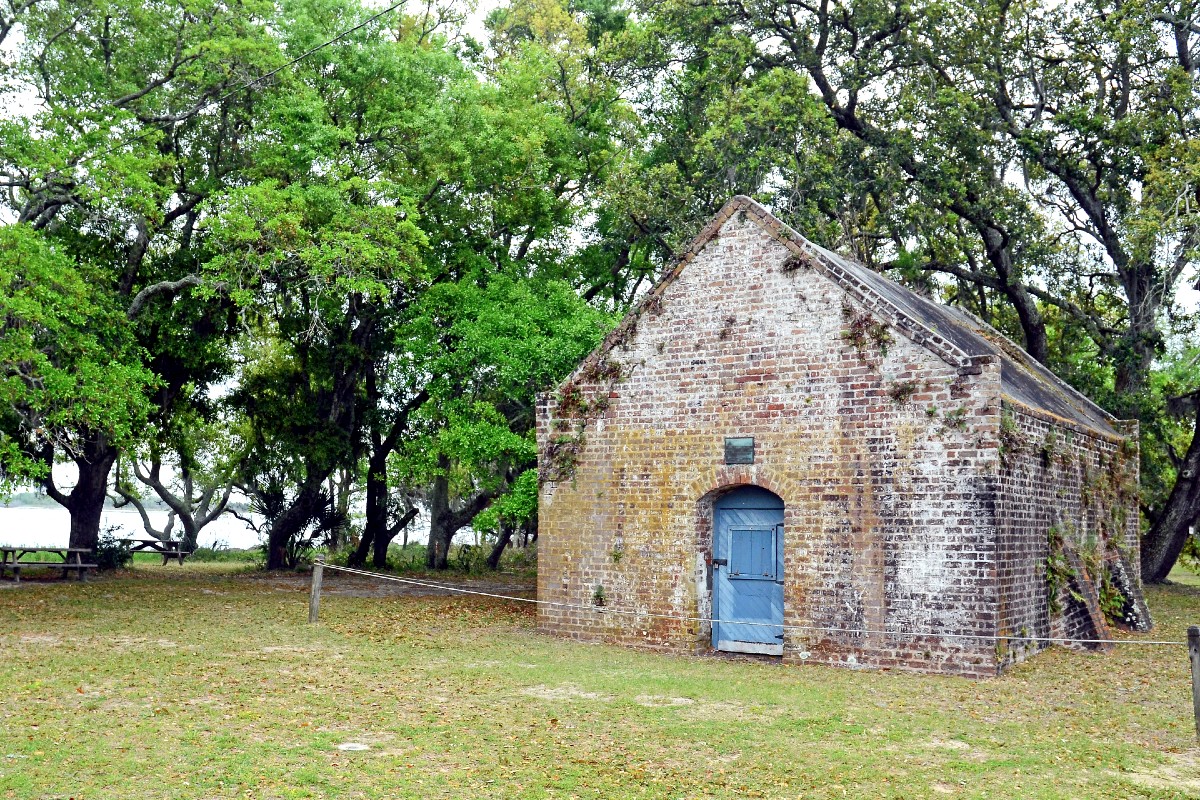
A longtime photo sleuth sent in this image and challenged Statehouse Report readers to identify it. Send us your guess – as well as your name and hometown – to feedback@statehousereport.com.
 Nobody correctly identified the rack of ribs pictured last week as barbecued goat. Two eagle-eyed readers, however, correctly identified the location as being in Riverfront Park in North Charleston. Hats off to George Graf of Palmyra, Va., and Jay Altman of Columbia.
Nobody correctly identified the rack of ribs pictured last week as barbecued goat. Two eagle-eyed readers, however, correctly identified the location as being in Riverfront Park in North Charleston. Hats off to George Graf of Palmyra, Va., and Jay Altman of Columbia.
The photo was taken at the December 4 Heritage Fire food competition where hundreds enjoyed roasted meats, whiskey, beer and other tasty concoctions as more than 20 chefs competed to be Heritage Hero.
>> Send us a mystery picture. If you have a photo that you believe will stump readers, send it along (but make sure to tell us what it is because it may stump us too!) Send to: feedback@statehousereport.com and mark it as a photo submission. Thanks.
- ORDER NOW: Copies are in Lowcountry-area bookstores now, but if you can’t swing by, you can order a copy online today.
- Now available as an e-book!
ABOUT STATEHOUSE REPORT
Statehouse Report, founded in 2001 as a weekly legislative forecast that informs readers about what is going to happen in South Carolina politics and policy, is provided to you at no charge every Friday.
- Editor and publisher: Andy Brack, 843.670.3996
Donate today
We’re proud to offer Statehouse Report for free. For more than a dozen years, we’ve been the go-to place for insightful independent policy and political news and views in the Palmetto State. And we love it as much as you do.
But now, we can use your help. If you’ve been thinking of contributing to Statehouse Report over the years, now would be a great time to contribute as we deal with the crisis. In advance, thank you.
Buy the book
Now you can get a copy of editor and publisher Andy Brack’s We Can Do Better, South Carolina! ($14.99) as a paperback or as a Kindle book ($7.99). . The book of essays offers incisive commentaries by editor and publisher Andy Brack on the American South, the common good, vexing problems for the Palmetto State and interesting South Carolina leaders.
More
- Mailing address: Send inquiries by mail to: P.O. Box 21942, Charleston, SC 29413
- Subscriptions are free: Click to subscribe.
- We hope you’ll keep receiving the great news and information from Statehouse Report, but if you need to unsubscribe, go to the bottom of the weekly email issue and follow the instructions.
- Read our sister publication: Charleston City Paper (every Wednesday in print; Every day online)
- © 2022, Statehouse Report, a publication of City Paper Publishing, LLC. All rights reserved.















 We Can Do Better, South Carolina!
We Can Do Better, South Carolina!